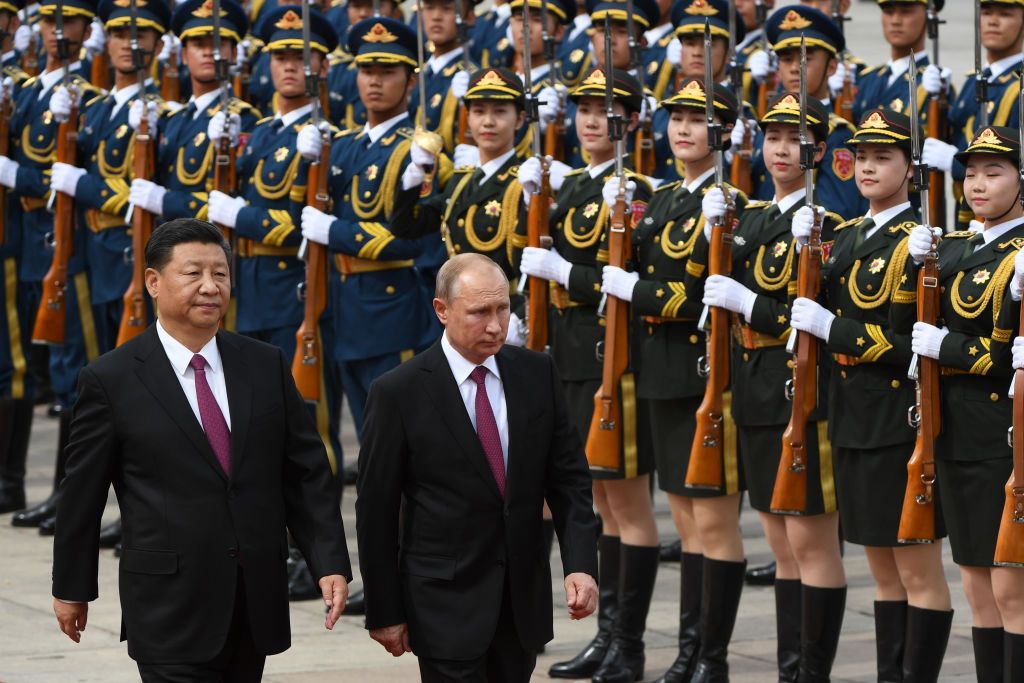Opinion: Why supporting Ukraine enhances US national security

CAMBRIDGE – Observing Republican members of Congress oppose the extension of U.S. support to Ukraine, one cannot help but wonder what happened to one of the United States’ two major political parties. This includes those GOP politicians who, while ostensibly supportive of Ukraine, allow their colleagues to hold it hostage to unrelated concerns about the U.S.-Mexico border. Given the dire consequences of a potential Russian triumph in Ukraine, it is abundantly clear that supporting the Ukrainian war effort should be a top foreign-policy priority. But some in Congress evidently need a reminder of some basic history.
In 1916, U.S. President Woodrow Wilson was re-elected with the slogan, “He kept us out of war,” in reference to World War I. This was in line with a tradition, dating back to the U.S. founding, of avoiding what Thomas Jefferson called “entangling alliances.” As John Quincy Adams famously put it in 1821, the U.S. does not go “abroad in search of monsters to destroy.”
Nevertheless, the U.S. entered WWI in 1917, largely owing to Germany’s resumption of submarine attacks on neutral vessels, which had resulted in the loss of American lives. The arrival of U.S. forces in Europe played a pivotal role in shifting the balance of power, enabling the Allies to defeat Germany and leading to the armistice on Nov. 11, 1918.
During the 1919 Versailles negotiations, Wilson persuaded European powers to endorse a new global order, epitomized by the establishment of the League of Nations. But a resurgence of isolationism led the Senate to reject the Treaty of Versailles, thus preventing the U.S. from joining the League. This isolationist trend was also reflected in strong tariff protections that made the Great Depression worse than it had to be.
Two decades later, President Franklin Roosevelt, recognizing the public’s overwhelming opposition to entering World War II, vowed during his 1940 re-election campaign to keep the U.S. out of foreign conflicts. Instead of deploying American troops to Europe, he repositioned the U.S. as the “arsenal of democracy,” sending military aid to the United Kingdom, which at the time stood virtually alone against the Nazi war machine. In 1941, Roosevelt’s Secretary of War, Henry Stimson, urging the Senate Foreign Relations Committee to approve the Lend-Lease Act, argued that providing the Allies with vital resources was tantamount to “buying our own security.”
But this strategic debate was rendered irrelevant when Japan attacked Pearl Harbor in December 1941, less than a year into Roosevelt’s third term, compelling the U.S. to enter WWII. By the end of the war, the prevailing view among Americans was that Europeans were unable to manage their own affairs. To prevent another global catastrophe, the thinking went, the U.S. needed to assume a more active global leadership role.
In the years that followed, the U.S. spearheaded the Marshall Plan and the establishment of NATO, the Bretton Woods institutions, and other pillars of the liberal international order. This strategy proved spectacularly successful, ushering in eight decades of relative peace and prosperity in much of the world – a virtually unprecedented achievement. Throughout the era of Pax Americana, the use of force to redraw national borders was very rare.

To be sure, the U.S. made numerous foreign-policy mistakes, frequently backing regimes that lacked the support of their own citizens and instigating unnecessary confrontations with perceived adversaries. Fueled by the belief that engaging in smaller overseas conflicts could forestall future large-scale wars, this approach led to an overreliance on military intervention.
This was apparent in the Vietnam and Iraq Wars. In Vietnam, the U.S. misinterpreted an anti-colonial independence movement as a proxy for the Soviet Union and China. In Iraq, the U.S. reacted to the terrorist attacks of September 11, 2001, by invading a country that had nothing to do with them. Both interventions were ill-conceived and costly in terms of lives and resources.
At times, the pendulum of American public opinion has shifted back toward non-intervention, as evidenced by the current political climate. But history has shown that these periods are typically short-lived. Moreover, the U.S. has a track record of sending mixed signals, not just by failing to follow through on threats it has made, but also by carrying out military actions that it had neglected to threaten.
American liberals sometimes contrast, say, the budgetary cost of the National Endowment for the Humanities ($211 million in the most recent fiscal year) with the cost of a single bomber plane (carrying a price tag of $750 million per plane, in the case of the B-21 Raider stealth bomber). This is unpersuasive to someone who may put little value on the NEH. But when it comes to supporting Ukraine, the debate is about the costs and benefits of various national-security expenditures.
Since February 2022, the U.S. has delivered roughly $75 billion in aid to Ukraine. While this is a substantial sum, as a share of GDP it is lower than the assistance provided by many European countries, particularly those in Scandinavia and Eastern Europe. For comparison, U.S. military spending stood at $812 billion in 2022. Moreover, the Iraq War, which contributed nothing to U.S. national security and killed nearly 500,000, is estimated to have cost $3 trillion.
Unlike in Vietnam, Afghanistan, and Iraq, Ukrainians support their democratically elected government and are of their own volition defending their country against invasion. At the same time, the principle that national borders should not be changed by force remains crucial to maintaining global stability and preventing future wars of aggression.
The U.S. has valid reasons to avoid a direct confrontation with Russia, not least the risk of nuclear war. But the Ukrainians are simply asking for the means to defend themselves, as U.K. Prime Minister Winston Churchill asked Roosevelt in 1940. Unlike America’s recent foreign-policy blunders, supporting Ukraine does not involve the loss of U.S. soldiers and actually contributes to national security.
Editor’s Note: Copyright, Project Syndicate. This article was published by Project Syndicate on Jan. 25, 2024, and has been republished by the Kyiv Independent with permission.The opinions expressed in the op-ed section are those of the authors and do not purport to reflect the views of the Kyiv Independent.













